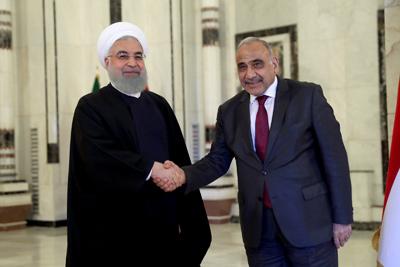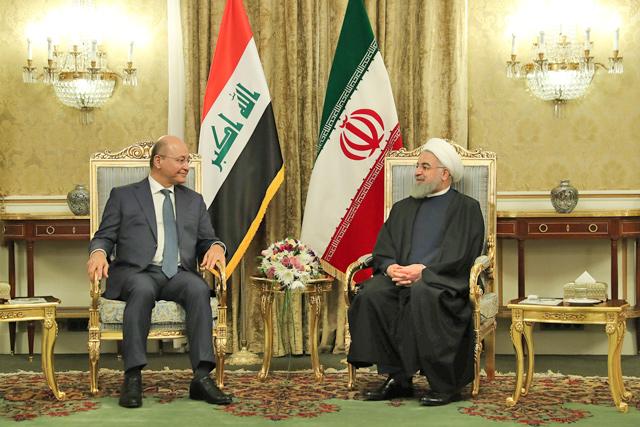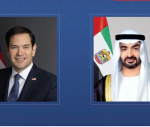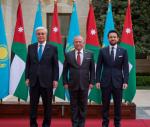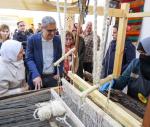You are here
Rouhani seeks to shore up Iran's influence on Baghdad trip
By Reuters - Mar 10,2019 - Last updated at Mar 10,2019
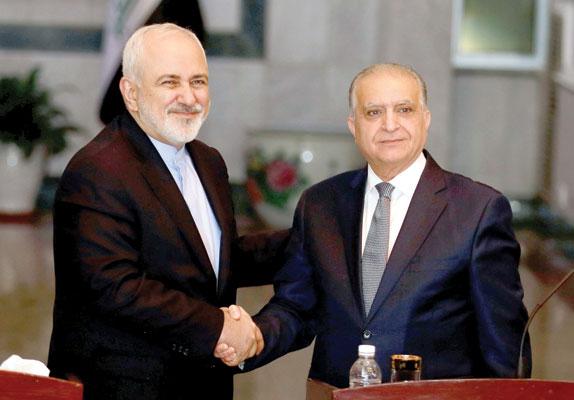
Iraqi Foreign Minister Mohammed Ali Alhakim shakes hands with his Iranian counterpart Mohammad Javad Zarif after a news conference in Baghdad, Iraq, on Sunday (Reuters photo)
BAGHDAD/GENEVA — President Hassan Rouhani's visit to Iraq this week is a strong message to the United States and its regional allies that Iran still dominates Baghdad, a key arena for rising tension between Washington and Tehran.
The first Iranian presidential visit to Iraq since 2013 is also meant to signal to President Donald Trump's administration that Tehran retains its influence in much of the region despite US sanctions.
"Iran and Iraq are neighbours and no country can interfere in their relations," Foreign Minister Mohammad Javad Zarif said after arriving in Baghdad to prepare for the visit.
Rouhani's three-day trip starting on Monday includes meetings with Iraq's president and prime minister, tours of Shiite Muslim holy sites and a meeting with top Iraqi Shiite cleric Grand Ayatollah Ali Al Sistani, Iranian state media reported.
Rouhani made clear last week the debt he believes Baghdad owes Tehran for support in the battle to defeat Daesh. Iranian forces and the militias they back played a crucial role defeating Daesh in Iraq and Syria.
“If the support of the Islamic Republic of Iran didn’t exist then Baghdad and the Kurdistan region would have definitely fallen and Daesh would dominate the region,” he said in comments published on his official website.
Iran mostly relies on other senior officials to conduct its dealings with Iraq, with which it shares an almost 1,500 kilometre long border. Most prominent of these has been Revolutionary Guards commander Qassem Suleimani, who was instrumental in directing the battle against Daesh in Iraq and Syria.
But as it tries to counter the pressure from US sanctions, Iran is seeking to shore up its political and economic influence along a corridor of territory it effectively controls from Tehran to the Mediterranean through Iraq, Syria and Lebanon.
“Tehran and its allies in Baghdad and Damascus achieved victory in the war against the Islamic State [Daesh] but the Islamic Republic risks losing the peace,” said Ali Alfoneh, senior fellow at the Arab Gulf States Institute in Washington.
“Apart from Russian companies, UAE companies are aggressively trying to gain a foothold in Iraq and Syria, which would deprive Iranian companies of reaping the fruit of their war era effort.”
Iran’s influence in Iraq will be difficult to dislodge, however. Through allied Iraqi politicians and paramilitary groups, it emerged as the dominant force after the US-led invasion that toppled Saddam Hussein in 2003.
Iran officially has no military presence in Iraq but backs its most powerful Shiite paramilitary groups. An umbrella grouping of all Iraq’s Shiite militias is estimated at 150,000 fighters.
Last week Washington blacklisted another Iran-backed militia that has helped create a supply route through Iraq to Damascus. The United States has around 5,200 troops stationed in Iraq.
Tehran also has powerful allies in Iraq’s parliament whose attempts to pass a bill forcing US troops to leave the country might be aided by Trump’s belligerent anti-Iran rhetoric — especially comments roundly derided by Iraqi leaders that US forces in Iraq, ostensibly there for the battle against Islamic State, can be used to “watch Iran”.
Pressure on Iran’s dominance
Iraq remains heavily dependent on Iranian energy supplies to feed its power grid, despite US attempts to wean Baghdad off Iranian gas.
Nevertheless, Washington’s strategy has caused some friction between Iraq and Iran. Last month Iranian Oil Minister Bijan Zanganeh criticised Iraq for failing to pay a $2 billion debt for energy imports as a result of compliance with the US sanctions regime.
Meanwhile, Gulf Arab states including Iran’s arch-foe Saudi Arabia have made overtures to the Iraqi government for energy and other economic deals, although with limited success.
Iran and its Iraqi allies also face the challenge of popular discontent over its dominance — not only in northern Sunni areas where Shiite militias have deepened their control, but even in southern Shiite heartlands.
Protests that broke out across southern Iraq last year over lack of services took up anti-Iranian slogans, and demonstrators stormed the Iranian consulate in the city of Basra.
“There are growing tensions in predominantly Shiite provinces which at one point were assumed to be pro-Iranian,” said Renad Mansour, research fellow at Chatham House.
“Part of their frustrations are targeted towards Iran and the Islamist parties that Iran supports... for Iran, the priority in Iraq is for it to remain stable and for their interests to be ensured.”
Related Articles
BAGHDAD — Iraq and Iran signed several preliminary trade deals on Monday, Iraqi officials said, as Iranian President Hassan Rouhani began hi
Iran is wrestling with a complex array of historic alliances and enmities as it tries to develop a coherent response to the swift advance of hostile Sunni Muslim militants in neighbouring Iraq.
DUBAI — Iran and Iraq could raise their annual bilateral trade to $20 billion from the current $12 billion, President Hassan Rouhani said on

Opinion
Feb 18, 2025
Feb 18, 2025
- Popular
- Rated
- Commented
Feb 18, 2025
Feb 18, 2025
Newsletter
Get top stories and blog posts emailed to you each day.


